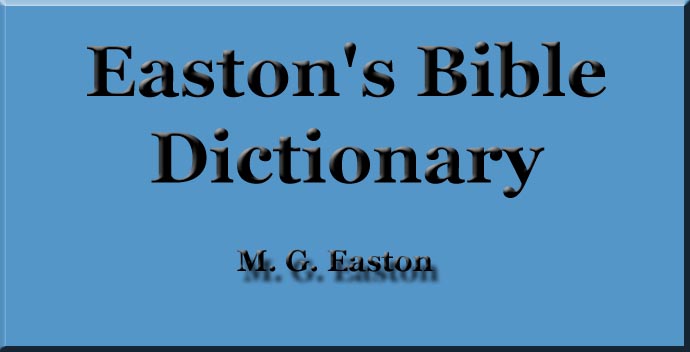

Sheriffs (Dan 3:2), Babylonian officers.
Sheshach (Jer 25:26), supposed to be equivalent to Babel (Babylon), according to a secret (cabalistic) mode of writing among the Jews of unknown antiquity, which consisted in substituting the last letter of the Hebrew alphabet for the first, the last but one for the second, and so on. Thus the letters sh, sh, ch become b, b, l i.e., Babel. This is supposed to be confirmed by a reference to Jer 51:41, where Sheshach and Babylon are in parallel clauses. There seems to be no reason to doubt that Babylon is here intended by this name. (See Streane's Jeremiah, l.c.)
Sheshai Whitish, one of the sons of Anak (Num 13:22). When the Israelites obtained possession of the country the sons of Anak were expelled and slain (Jos 15:14; Jdg 1:10).
Sheshbazzar O sun-god, defend the lord! (Ezr 1:8, Ezr 1:11), probably another name for Zerubbabel (q.v.), Ezr 2:2; Hag 1:12, Hag 1:14; Zac 4:6, Zac 4:10.
Sheth Tumult. (1.) "The children of Sheth" (Num 24:17); R.V., "the sons of tumult," which is probably the correct rendering, as there is no evidence that this is a proper name here. (2.) The antediluvian patriarch (Ch1 1:1).
Shethar A star, a prince at the court of Ahasuerus (Est 1:14).
Shethar-boznai Star of splendour, a Persian officer who vainly attempted to hinder the rebuilding of the temple (Ezr 5:3, Ezr 5:6; Ezr 6:6, Ezr 6:13).
Sheva Heb. Shebher . (1.) The son of Caleb (Ch1 2:49). (2.) Heb. Sheva' , one of David's scribes (Sa2 20:25).
Shewbread Exo 25:30 (R.V. marg., "presence bread"); Ch1 9:32 (marg., "bread of ordering"); Num 4:7 : called "hallowed bread" (R.V., "holy bread") in Sa1 21:1. This bread consisted of twelve loaves made of the finest flour. They were flat and thin, and were placed in two rows of six each on a table in the holy place before the Lord. They were renewed every Sabbath (Lev 24:5), and those that were removed to give place to the new ones were to be eaten by the priests only in the holy place (see Sa1 21:3; compare Mat 12:3, Mat 12:4). The number of the loaves represented the twelve tribes of Israel, and also the entire spiritual Israel, "the true Israel;" and the placing of them on the table symbolized the entire consecration of Israel to the Lord, and their acceptance of God as their God. The table for the bread was made of acacia wood, 3 feet long, 18 inches broad, and 2 feet 3 inches high. It was plated with pure gold. Two staves, plated with gold, passed through golden rings, were used for carrying it.
Shibboleth River, or an ear of corn. The tribes living on the east of Jordan, separated from their brethren on the west by the deep ravines and the rapid river, gradually came to adopt peculiar customs, and from mixing largely with the Moabites, Ishmaelites, and Ammonites to pronounce certain letters in such a manner as to distinguish them from the other tribes. Thus when the Ephraimites from the west invaded Gilead, and were defeated by the Gileadites under the leadership of Jephthah, and tried to escape by the "passages of the Jordan," the Gileadites seized the fords and would allow none to pass who could not pronounce "shibboleth" with a strong aspirate. This the fugitives were unable to do. They said "sibboleth," as the word was pronounced by the tribes on the west, and thus they were detected (Jdg 12:1). Forty-two thousand were thus detected, and "Without reprieve, adjudged to death, For want of well-pronouncing shibboleth."